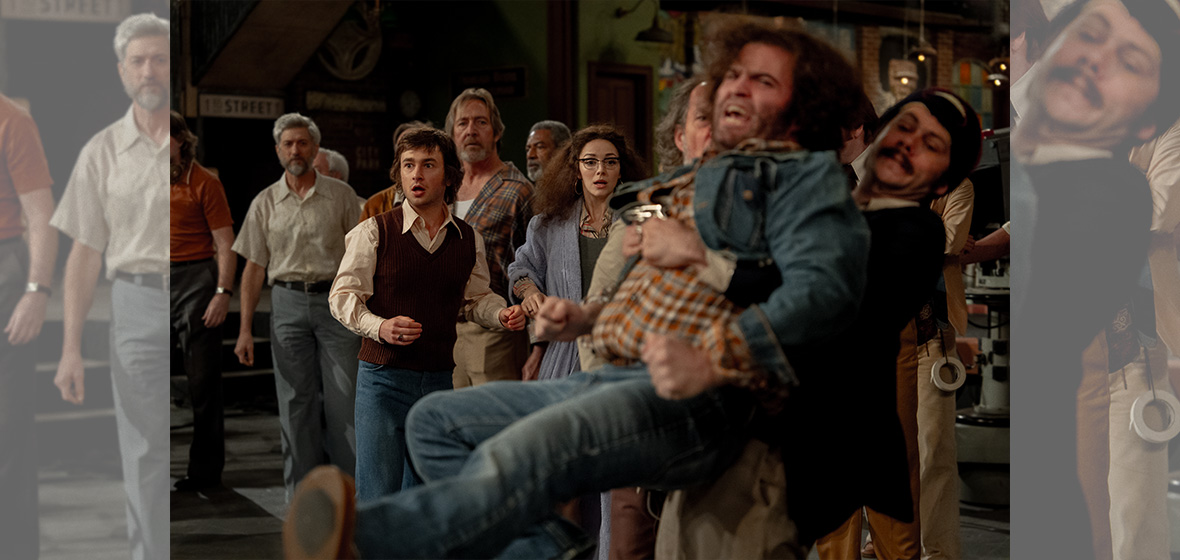Any story about the making of the first episode of Saturday Night Live loses some of its stressful impact because we all know what happened after – the show goes on to become one of the most successful television shows in the world. Now in its 50th season, it kickstarted the careers of several generations of American comedians and movie stars. We all know the outcome, so it is strange that director Jason Reitman relied on the dramatic arc of this story on the expectation of “will they/won’t they make it”. They made it. We know that.
That’s the number one problem behind Saturday Night, a film set 90 minutes before airing the first episode of the now iconic variety comedy show. The scenario is set in pure chaos. Producers don’t know what the show is about, some sketches haven’t been locked in, the host is high on cocaine, part of the set is not yet built, and some of the crew just quit. And at the epicentre lies the show’s creator, Lorne Michaels (Gabriel Labelle), calmly putting out the fires.
You can see something is wrong with the way this adaptation works with the decision to start with an NBC page (Finn Wolfhard) trying to convince people to come to the taping of this show, and he can’t even give seats away. There’s no way they would struggle to find an audience to see a comedy show in New York hosted by George Carlin and with musical performances by Billy Preston and Janis Ian. Carlin’s name alone would’ve caused a line around the block in 1975.
Nothing wrong with Reitman and his co-writer Gil Kenan taking some dramatic liberties, but this feels like a missed opportunity to develop a unique take. The story of Saturday Night Live is now legendary; it doesn’t need to pretend Michaels and his writers were fighting against the whole world. The exciting thing about it is how they had the zeitgeist behind them, and that’s precisely how they managed to destroy the status quo and re-invent television for the next three decades.
Reitman’s trick is that he tries, to the best of his ability, to play everything in real-time. So we follow Michaels from department to department as he tries to please and help everyone while still figuring out what the show is about. Each person in the talent is dealing with their own problems – Chevy Chase (Cory Michael Smith) already feels like he’s getting too big for the show, John Belushi (Matt Wood) is unreliable, unpredictable, and still hasn’t signed his contract, and Garrett Morris (Lamorne Morris) is struggling to find his place in the show beyond a token African-American. Guest star Jim Henson (Nicholas Braun) doesn’t feel respected by the writers, especially head writer, Michael O’Donoghue (Tommy Dewey), who is himself dealing with the NBC censor butchering his work. And that’s not even getting into the show’s producer Dick Ebersol (Cooper Hoffman) and head of NBC, Dave Tebet (Willem Dafoe), threatening to pull the plug. George Carlin (Matthew Rhys) having a crisis of drug-fuelled identity, and Michael’s wife, and show’s writer, Rosie Schuster (Rachel Sennot) add some marital issues to the plot.
It’s pandemonium but too engineered, so while the energy is infectious, Reitman misses the point he’s trying to make. There’s a complete devotion for Michaels at the expense of everyone else. It perceives him as a curator of ragtag punk talented slackers and not what they actually were – a group of histrionic rich kids that were channelling a new generation of post-war consumers. They were the establishment, and so was SNL. As a result, Reitman comes out incredibly mean-spirited towards Henson, Carlin, and, for some uncalled reason, the idea of unionised work – made even more damning by the film’s adulation for the manager.
Nothing in it is bad, and some of the actors make it work very well—especially Dafoe, Hoffman, JK Simmons (as Mr. Television himself, Milton Berle), Rhys, and Sennot. Unfortunately, some of the main actors don’t have the gravitas to hold the complexity of funny people fighting demons, so neither Smith, Wood, nor Labelle make it work beyond the fact that they look like the young versions of the people they’re portraying.
I sense Reitman wanted to make Birdman, but it’s real. The film is shot in this appealing grainy 16mm stock, and the camera floats around trying to embrace the chaos, but it’s never uncomfortable or stressful. I like that many stories have no resolution or even sometimes a point; they’re just there to add to the burning pile of Michaels’ life. It feels genuine in a sense, but at the end of the day, Saturday Night is more like Air – another variation in this new Hollywood trend to make biopics about how amazing their corporate world is.
Reitman is the son of Ivan Reitman, an esteemed filmmaker who worked with many people involved in the first season of SNL (especially Belushi, Akroyd, Gilda Radner, etc.). Maybe he’s too close to the material to be able to separate it from its self-importance.
Verdict: 3 out of 5
For SNL-heads who are okay with a little bit of narrative liberty and not too picky about how their favourite artists are portrayed.




